As a small business, ranking for keywords can be difficult. With larger, more resourceful companies targeting the same terms, it seems impossible to get to the top of search engine results pages (SERPs).

So how do small businesses expect to rank high on the SERPs? Fortunately, with the use of local SEO, there are better opportunities.
If one thing is for sure, local SEO has never been more important to small businesses than it is now. Just consider that “where to buy” + “near me” mobile queries increased by more than 200% from 2017 to 2019.
Not to mention recent research shows that 69% of digital traffic is organic and local. What this means is streamlining local organic SEO strategies is more important than ever for small businesses.
This guide will introduce you to local SEO for small businesses. Read on to find out the 12 local SEO tips and the tools you need to get started.
Local SEO for Small Businesses
Search Engine Optimisation (SEO) is the process of improving your website to increase your chances of being seen when people search for terms related to your business. Local SEO is similar but with a special focus on local keyword terms.
The goal is to drive local traffic to your website—traffic that’s more likely to convert, whether online or offline.
Why Is Local SEO Important for Small Businesses?
Local SEO is more important than ever for small businesses as more and more people rely on online information for offline purchases. In fact, one study found that 78% of local mobile searches lead to offline purchases. You can’t dispute these results!
Another reason to optimise your website for local SEO is the opportunity to build your website as an authority and educate your target audience about your products and services.
Your local SEO efforts don’t have to focus on increasing sales. You can also use your local SEO strategy to increase traffic to your website for informational or educational purposes.
Local SEO Tips for Small Businesses
Many local SEO tips can be implemented in minutes, while others take longer. However, each of the tips below can significantly benefit your local business, both online and offline.
1. Optimising Google Business Profile (previously GMB)
Google Business Profile (previously GMB) is a business directory owned and operated by Google. This platform aims to provide searchers with the most accurate business information for local businesses.
With that in mind, most businesses will have a Google My Business listing within about a year of starting their business. This happens automatically when Google discovers your business through web crawlers.
However, the problem with automatic listings is that the information may not be complete or accurate. You can only ensure that you make the most of your platform by claiming your listing.
If you need more reasons to claim or create your listing, consider that businesses with four stars or more on Google My Business outrank businesses with less than four stars by about 11%. As a small business, you can’t afford to lose this advantage.
How can you completely optimise your Google My Business listing? Here are a few essential steps to get you started:
- Claim or create your Google My Business listing.
- Complete profile data as accurate as possible and publish your listing.
- Add photos and videos of your business and offerings to your profile.
- Respond to ratings and reviews in a professional and timely manner.
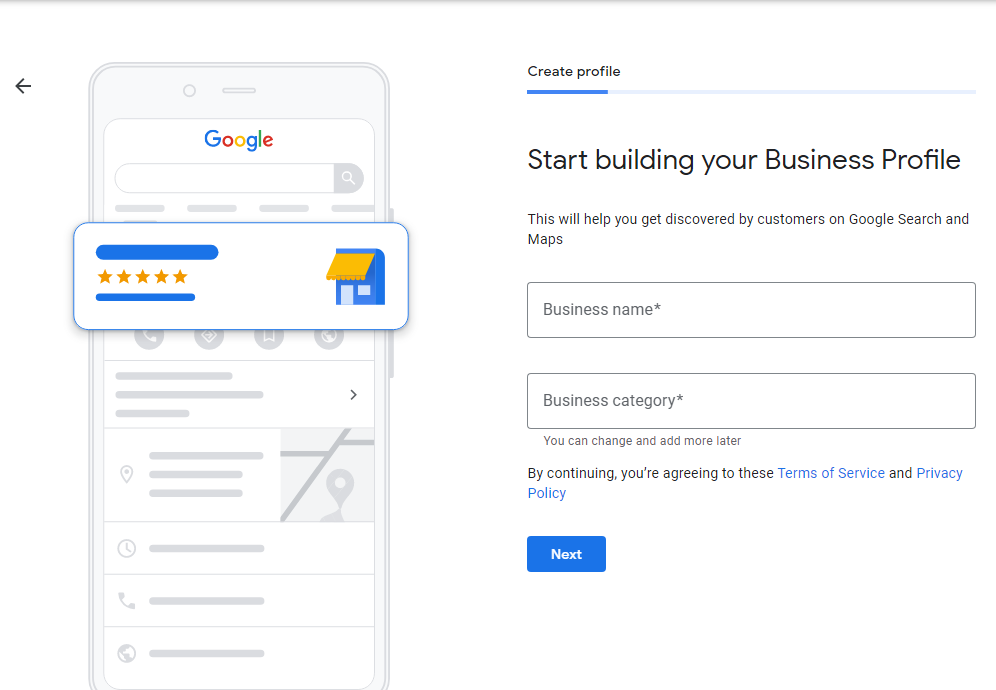
Your business information must be accurate and up to date. You should ensure that updates are made at least once a month, although monitoring your ads on a weekly basis is critical to success.
Need help with optimising your GBP listing?
Leave out all the daily tasks of checking your Google My Business profile to our digital marketing strategists! Rest assured that your business information is updated and relevant, all products and services optimised, all the latest content and offers are up-to-date with our Google My Business management service!
We’ll help set up and optimise your Google My Business profile to maximise your visibility in Google, increase your leads and drive more traffic to your brick-and-mortar storefront!
2. Claim All Local Business Platforms
Speaking of business directories, you need to ensure that you claim your permissions in all business directories. Popular apps include the Google My Business mentioned above and Yelp.
You may think that a Google Business Profile is sufficient to bring in traffic, both online and in-store. However, consider that the Yelp site is in the top 5 results for 92% of search queries containing a city and business category.
What’s the difference between your list appearing in Google’s Top 5 results? The top five SERP results make up 80% of Google’s first page clicks. The first organic result alone accounts for almost 40%.
All of this to say, you can’t afford to claim your business on all directories wherever possible.
Fortunately, business directories make it easy to claim your listings. To claim your Yelp business page, you can begin the process by verifying your business information.
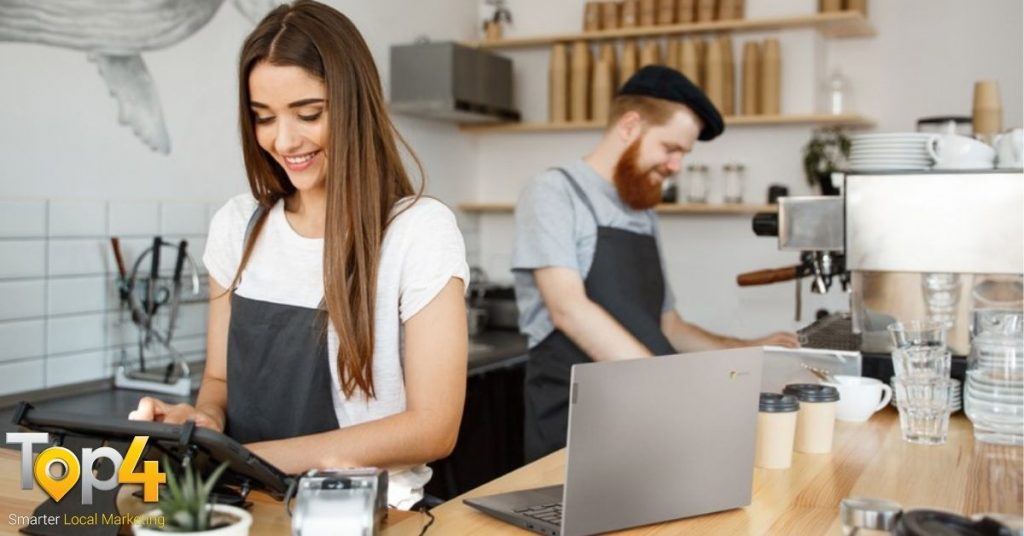
While Google and Yelp are the big dogs, other business directories are Facebook, Yellow Pages and Top4.
The ultimate marketing platform for your website!
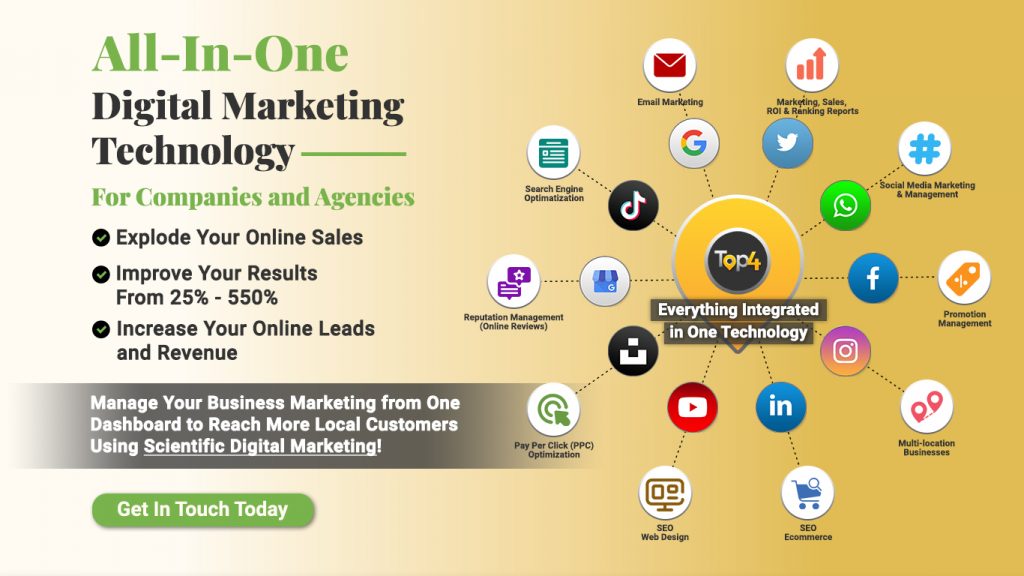
On a similar note, Top4 is our proprietary location-based marketing platform for businesses of all sizes. It’s a simple, cost-effective way to advertise your business, products and services. Whether you have one or 100 locations, you can manage all your businesses from a single dashboard.
Claiming a listing is one of the more impactful ways of improving your business’ online presence. Top4 Marketing takes tedious time and meticulous work in putting your brand out there. You don’t have to do it anymore by yourself! Focus on running your business while we help optimise your business’ online visibility with professionalism and efficiency.
3. Conduct a Local SEO Audit
Now that you’re set up on the business directories, it’s time to understand the big picture. This lets you know what your competitors are doing so you can make the same (and better) improvements to your site.
Results on the first page of SERPs provide the most insight and inspiration. After all, the top three positions alone account for 66.5% of clicks on the SERPs!
First, consider free tools and analysers like the SEO Analyzer as you begin your audit. These tools give you a detailed overview of your website’s current status and what you can do to optimise.

Next, use your target keywords (which you’ll work out in the next section) and compare your website to the top five of each SERP. Consider types of content, website structure, page elements, and keyword density.
We recommend keeping a spreadsheet of your results to track and deploy your changes easily.
Don’t rank #1 in search results? Find out why with SEO Audit services!
Are you struggling to rank well in organic search results? If your website is not ranking as high as it should be, there are a number of factors that could be holding you back. With our website SEO audit services, our team will perform a comprehensive audit on your site to identify problems holding your site back from ranking well in organic search results.
4. Target Local Keywords
As a small business, keyword targeting can be difficult. You know you’ll get lost in the sea when targeting high-volume keywords but low-volume keywords tend to yield little profit.
As a local business, you have an advantage in keyword targeting. Variants of the search term “near me” have grown from 150% (e.g., “near me now”) to 900% (e.g., “near me today/tonight”) in just a few years. This means that targeting a mix of high volume and local keywords can work.
What do I mean in practice?
Let’s say you own a local flower shop. Your website naturally contains many high-volume keywords, such as “florist,” “flower shop,” and “flowers for sale.” You’re unlikely to beat out national flower providers, like 1-800-Flowers and Sam’s Club, with those keywords.
The goal should be to optimise your website with local keywords.
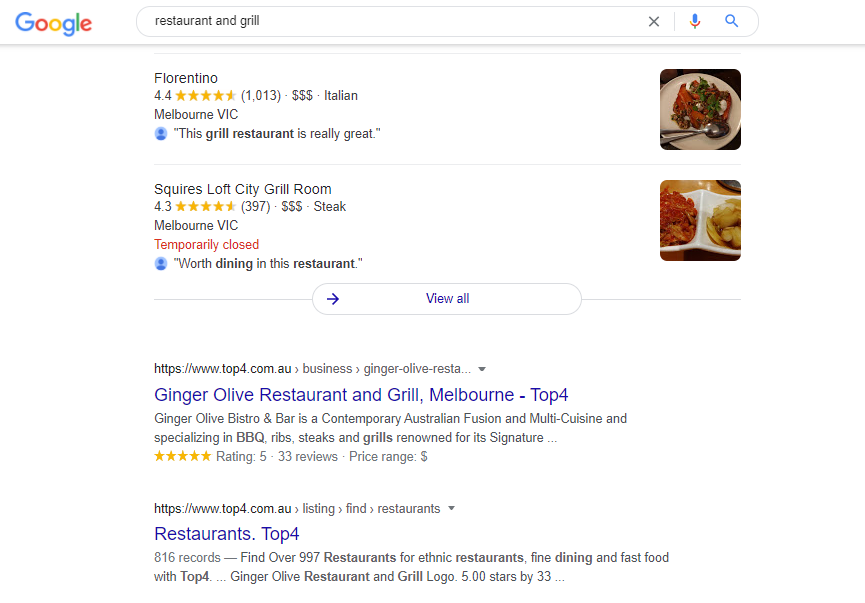
For example, search your site every time “flowers for sale” appear. You’ll want to be wary of keyword stuffing but make sure to replace most of these with more local-specific terms such as:
- flowers for sale in [city or zip code]
- [city or zip code] flowers for sale
- flowers for sale [city or zip code]
However, you don’t have to target only your specific town and zip code. Consider areas within 10 or 15 miles of your business and target those local keywords. This is especially good practice if you live in a small town outside of a big city or metropolitan area.
5. Encourage (and Reward) Customer Reviews
When did you last visit a restaurant or purchase an item without looking for ratings and reviews? If you’re like 82% of consumers who do local searches online, the answer is never.
Customer reviews are the lifeblood of your business. This is particularly true for new and small businesses.
How can you obtain online customer reviews?
First, ensure there is a place for customers to leave reviews. You’re on the right track if you’ve claimed your Google My Business profile and business listing on Yelp.
Then provide incentives to customers who leave reviews. Inform the customer if the word-of-mouth or in-store receipt states that they receive a discounted or free item for rating and review.
The work doesn’t stop there, though. You must respond to all reviews, negative and positive. This gives you an opportunity to engage with your customers and it can also instill faith in your brand in those who have yet to purchase.
6. Create a Local Content
Above, we’ve talked about targeting local keywords while avoiding keyword abuse. The best way to do this is to create local content for your website or blog.
Local content can be a blog post, a news release, or a static web page. You can use these different types of content to highlight local events (past and upcoming), local deals, and local business summaries (e.g., local businesses). means that complement but do not compete with yours) or even to educate the public about your product or service.
The more natural content you have on your website, the more easily you can target local keywords. It can also help establish you as an expert in the field, which is crucial for small business owners competing against larger businesses.
Using the example of a florist, here are some content ideas that will naturally target both audience and keywords:
- Blog post: [your state] Flowers for Year-Round Decorating
- Static web page: Our Local [your state] Flower Offerings
- Static web page: [your state] Garden Flower Offerings
- Blog post: [your state] Flower Events for [season/year]
7. Implement Local Backlink Strategy
Backlinks are links from another website to your website. Depending on the quality of your third-party site and the number of links that point to your site, this can significantly impact your site’s permissions.
Authority is essential in determining your site’s ranking in the SERPs. How do we know this? Consider that the #1 result in Google has an average of 3.8x more backlinks than positions #2 to #10.
How can a small business website begin to build its backlink profile? A few things to consider are:
- writing guest posts for relevant, high-quality websites in your industry
- engaging in influencer outreach
- participating in link outreaches
- “listening” for brand mentions
- writing shareable content
Speaking of shareable content, the key to any successful backlink strategy is quality, reasonably lengthy content. After all, long content gets 77.2% more backlinks than short articles.
You don’t want long content for content’s sake. So keep the post relevant, valuable and free of fluff.
8. Become Mobile-Friendly
Considering 82% of smartphone shoppers conduct “near me” searches, you can’t afford to have a mobile-friendly site.
The hard work is not to get traffic to your site; it keeps it there when it arrives. If your site isn’t mobile-friendly, local searchers will immediately abandon your site and consider competitors instead.
What is a mobile-friendly site? The four essential elements that every mobile-friendly site should contain include:
- responsive page display
- readable fonts
- proper text formatting
- optimised media display
In addition to having a mobile-friendly website, you also need to create mobile-friendly content. The good news about mobile-friendly content is that it can also be viewable by desktop readers.
What does such content consist of?
- short paragraphs
- white space
- subheadings
- a summary
- images
- lists
- styling (e.g., bold, italics)
If you’re not a web developer, creating a mobile-friendly website can be daunting. The good news is that most website platforms integrate mobile-friendly elements into their themes and overlays. Look for “responsive” as an indicator of such an option.
9. Page Structure Optimisation
Local SEO for business goes beyond business listings and content. One element that is often overlooked is the page structure.
Page structure includes title tags, headers, meta description and URL. These can further enhance your content and improve your rankings on SERPs when used correctly.
You may be wondering how these factors can affect your ranking. The transactions are as follows: Using elements that your competitors may not have will help you move forward.
Which element of the site structure is most often overlooked by small businesses? From maximum to minimum, the percentage of small business owners using the following key SEO features is:
- title tag: 99%
- Robots.txt: 88%
- Sitemap.xml: 73%
- Meta description: 72%
- H1: 68%
- Schema.org: 44%
You can easily address the title tag, meta description and H1. However, robots.txt, sitemap.xml and schema.org also have their place on a well-structured website.
10. Get Involved on Social Media
Social media isn’t just for big brands and influencers. A local business page can benefit from social media usage, too.
More specifically, a local business page can be a great place to keep customers up-to-date on the latest sales, events and changes (e.g., hours of operation). Even with a website, a social media profile is more like a “living” version of your business.
Facebook users can benefit most from local business pages. After all, a quarter of Facebook users in all countries surveyed said they visit their Local Business Page at least once a week. However, other social media platforms like Instagram and TikTok can also give your business an edge.
A few examples of the benefits of maintaining social media profiles for your small business include relationship building, trend tracking and analysis and social commerce.
Here’s how small businesses can get involved on social media:
- Decide which platforms are right for your business based on features and target audience.
- Post quality content regularly.
- Use scheduling and automation tools to test and improve engagement.
- Participate in local events and roundups.
- Make it easy for customers to purchase your products and services online.
Social media may or may not make up a large percentage of your sales and traffic, depending on your business and target audience. However, a strong social media presence is a must for small businesses.
11. Participate in Local Business Events
Are you surprised to find that there are many things you can do offline to improve your website’s local SEO? 48% of marketers invest at least 20% of their marketing budget in live events.
Participating in local business events, especially those with a strong social media presence, can help grow your business in a few ways. They’re an opportunity to market your business and an easy way to get to know your audience and the community you serve. There’s likely to be a return on such events, too.
As a small business, you can host your event or sponsor and participate in larger community events. A self-hosted event might yield more but a community event can be great for those on a tight budget.
12. Invest in Google Ads With Local Keywords
A small business usually means a small budget. You must invest wisely in growing your online business. Where should you protect your bets? For most businesses, Google Ads is a good place to start.
Google Ads is a paid advertising platform that enables you to appear in prominent places on the SERPs.
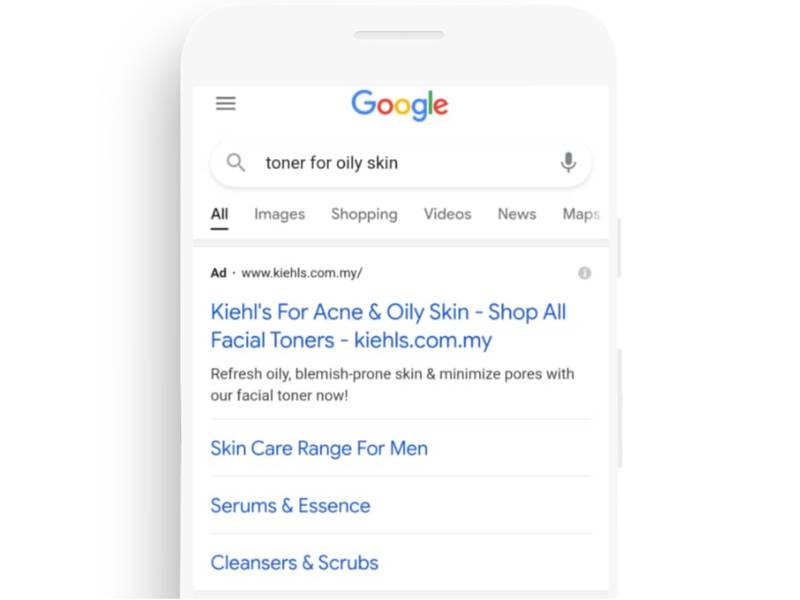
You may think that you could never compete with big businesses. One way to avoid this is to target local keywords and local audiences to emphasize local status. For example, instead of targeting “flowers for sale,” target “flowers for sale in [your city or zip code].”
How can we know that this will be successful? According to Think with Google, 72% of computer or tablet users and 67% of smartphone users want ads tailored to their city or zip code. Users want to find the most local option for them, so they provide what they need.
Starting with Google Ads can indeed be daunting. But fortunately, you have the option to invest in an advertising agency to help you set up and manage your account and keywords. If you want to go it alone, though, follow these essential steps:
- Conduct keyword research: This will include the keywords you want to target and the keywords you want to exclude from your campaign (negative keywords).
- Decide how your ad groups will be structured: Ad groups are advertising campaigns grouped by a common factor, such as target audience, target keywords, or even location. Decide on the distribution of your groups so you can start creating your campaigns.
- Create your first campaign: A campaign is a step above ad groups in that it encompasses a larger target audience. For example, you can have a “Wedding Flowers” campaign that includes ad groups like “Wedding Flowers in Queens” and “Wedding Flowers in Brooklyn.” This is where you will set campaign-level goals and settings.
- Create your first ad: There are several ad types in Google Ads. Text ads are a good place to start, but ad groups can contain multiple ad types, and it’s important to try something that helps your audience.
Continuous monitoring and tweaking of your campaigns are necessary for success.
How we can help
As a small business owner, you know that hard work and dedication are needed to grow your sales. Much the same can be said for local SEO. While SEO can take time and patience, it can pay off in the long run.
Even the smallest businesses can benefit from the 12 local SEO tips outlined above. From keyword research to social media marketing to paid advertising, you can begin to make changes today to see benefits in the future.
We understand that running a local business is a full-time job on its own. So why not focus on running your business and let the experts handle the SEO strategies on your behalf? Top4 Marketing is your dedicated marketing and technical team. Based in Australia and Indonesia, we are a full-service digital marketing agency that has worked with some of the biggest companies in Jakarta, Surabaya, Bali, and Sydney, Australia.
We set ourselves apart from other agencies in delivering meaningful results with our very own unique geolocation marketing platform, Top4. Built for you by experts, our proprietary technology makes it easy to start and run your business.
Top4 comes with several amazing features baked right in to get your business on the first page of Google. Designed to deliver to your target market using geographic, categorical and demographic targeting. Try it. It’s easy and takes only a few minutes! Join Top4 today!
To find out how we can help you with your Website + Marketing, using our unique location marketing platform called Top4, get in touch today at www.top4marketing.com
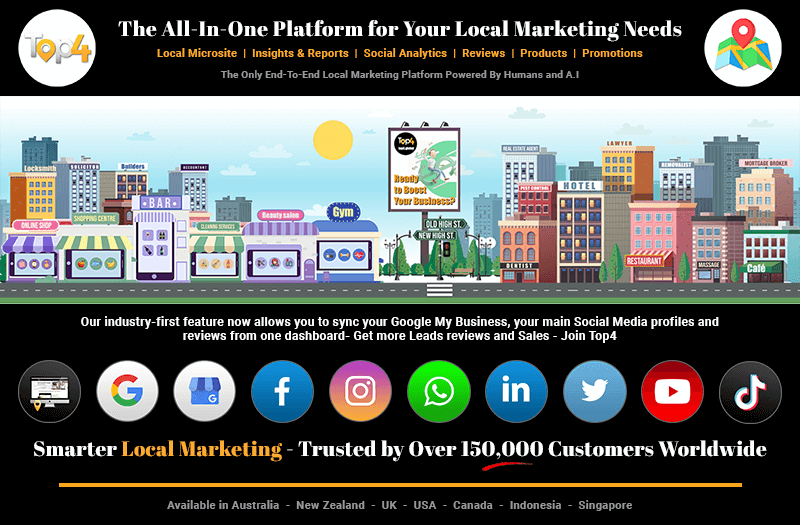
Looking to build customer loyalty through social media? Don’t forget to add your business to Top4.com.au
List your business, create your own digital store to sell goods and services, and share posts on social media. Promote your business on Google instantly! Should you need help with local digital marketing then view our new Google Marketing Platform and services Top4 Marketing
Get Found On Google Promote Your Website, Reach local customers today!
Our Digital Marketing Agency Services Across All Industries Include Search Engine Optimisation (SEO), Google Marketing, Website Design, Corporate Web Development, and local location-based marketing using our own Google Marketing Platform!
Engage A Social Media Agency For Only 1/3 The Cost Of Employing A Social Media Manager…LET’S TALK!




